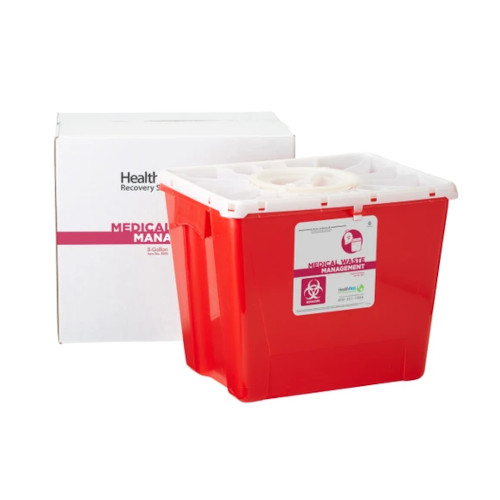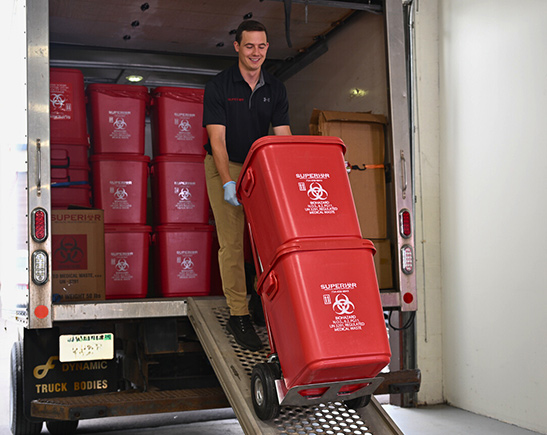Ecological Obligation: The Eco-Friendly Method to Medical Waste Disposal
Ecological Obligation: The Eco-Friendly Method to Medical Waste Disposal
Blog Article
Exploring Different Waste Disposal Options for a Cleaner Setting
In the pursuit of a cleaner environment, the monitoring of waste disposal has emerged as a crucial focal point for lasting advancement. With a wide variety of waste disposal options available, varying from standard garbage dump techniques to cutting-edge waste-to-energy innovations, the selection of exactly how we manage our waste has far-ranging ramifications for our world's wellness.
Recycling Methods
Implementing reliable reusing methods is important in decreasing waste and promoting sustainability in our environment. Reusing involves the process of converting waste materials right into recyclable things to stop unneeded disposal.
An additional vital recycling approach is composting, which includes decomposing natural waste like food scraps and lawn trimmings into nutrient-rich soil. By integrating these numerous reusing approaches right into our waste management techniques, we can substantially lower our environmental impact and relocate in the direction of a much more sustainable future.

Composting Techniques
Efficient waste management methods, such as reusing approaches, lead the way for a cleaner setting, and currently, changing the emphasis to 'Composting Techniques', we discover sustainable methods to disintegrate natural waste for environmental benefit. medical waste disposal.
Composting is a natural procedure that transforms organic waste, like food scraps and lawn trimmings, right into a nutrient-rich soil change. The key to successful composting depends on producing the best balance of eco-friendly materials, such as vegetables and fruit scraps, and brownish materials, like dried out fallen leaves and twigs. These materials break down with the assistance of bacteria, damaging down the waste into valuable compost.
There are various composting strategies offered to fit different needs. Standard backyard composting involves layering natural products in a bin or heap and on a regular basis turning the combination to aerate it. Vermicomposting, on the various other hand, uses worms to damage down raw material into garden compost (click here). For those with restricted room, indoor composting systems supply a practical solution. By making use of composting methods, we can minimize the quantity of waste sent to land fills while producing a useful item for enhancing soil and sustaining plant growth.
Incineration Disadvantages and pros
Incineration, as a waste disposal method, provides both advantages and downsides that merit mindful consideration in the world of lasting waste monitoring techniques. On the favorable side, incineration can significantly minimize the volume of waste, reducing the requirement for garbage dump area and potentially reducing greenhouse gas emissions.
Additionally, the high preliminary investment and operational prices of incineration centers posture financial challenges, making it a much less affordable alternative contrasted to various other waste management approaches. Cautious surveillance and regulation are crucial to mitigate these unfavorable effects and optimize the benefits of incineration as part of a comprehensive waste management approach.
Land Fill Management Approaches
Land fills play an essential role in waste monitoring and ecological preservation by giving a control system for the disposal of solid waste materials. By condensing the waste, the volume is reduced, allowing for even more waste to be suited over time.
Moreover, the application of everyday cover practices is crucial in minimizing smells, preventing litter, and reducing the attraction of insects. Covering the disposed waste at the end of every day aids to consist of odors and stop prospective environmental contamination. In addition, the monitoring of land fill gas discharges and leachate degrees is essential in guaranteeing that ecological criteria are satisfied and that any possible risks to surrounding ecological communities are minimized.

Waste-to-Energy Technologies
One of the innovative approaches to squander management entails taking advantage of Waste-to-Energy modern technologies to transform strong waste into usable energy sources. Waste-to-Energy (WtE) technologies include an array of procedures that intend to draw out power from waste materials via thermal, chemical, or organic methods. This conversion procedure not just decreases the volume of waste that winds up in garbage dumps but likewise produces useful energy resources such as power, warmth, or biofuels.
Incineration includes burning waste at high temperature levels to generate heat and electricity. Gasification converts waste right into a syngas, which can be utilized for power generation or chemical manufacturing.
Carrying out Waste-to-Energy technologies can help minimize ecological issues related to typical garbage disposal methods while concurrently offering a renewable resource source. Nonetheless, mindful consideration should be provided to discharges control and ensuring the sustainability of feedstock supplies for these modern technologies to be genuinely valuable for a cleaner environment.

Final Thought
Finally, discovering numerous waste disposal options such as reusing, composting, incineration, landfill management, and waste-to-energy technologies is important for advertising click resources a cleaner atmosphere - click here. Each technique has its own benefits and obstacles, but by utilizing a mix of these strategies, we can work towards minimizing the amount of waste that winds up in garbage dumps and inevitably add to an extra lasting future for generations to find
With a wide range of waste disposal alternatives offered, varying from traditional landfill methods to ingenious waste-to-energy technologies, the selection of exactly how we manage our waste has significant effects for our earth's wellness. medical waste disposal.Incineration, as a waste disposal approach, offers both benefits and negative aspects that merit mindful consideration in the world of sustainable waste management methods.Garbage dumps play a critical function in waste monitoring and environmental conservation by giving a control system for the disposal of solid waste products. By compacting the waste, the quantity is reduced, enabling for more waste to be suited over time
One of the cutting-edge strategies to lose monitoring entails using Waste-to-Energy modern technologies to transform solid waste into functional energy sources.
Report this page